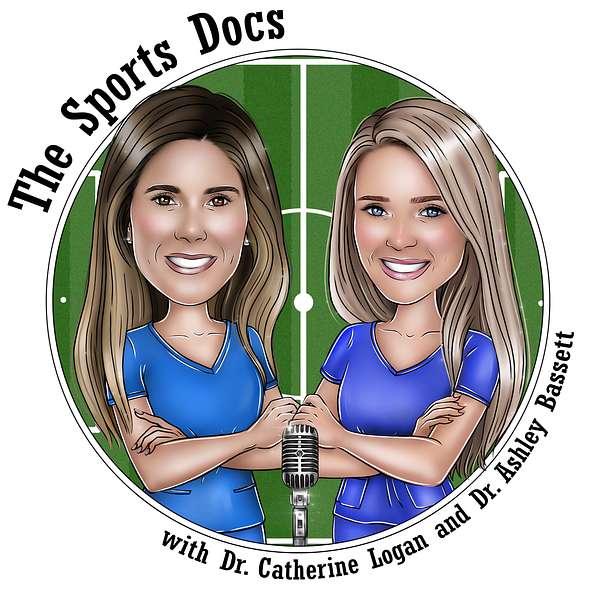
The Sports Docs Podcast
Sports medicine is a constantly evolving field, with hundreds of new articles published each month on the topic. This ever-growing wealth of information can make it challenging to stay updated on the newest approaches and techniques, and to know which data should actually change your practice. Join orthopedic surgeons, Dr. Catherine Logan and Dr. Ashley Bassett, as they chat about the most recent developments in sports medicine and dissect through all the noise.
On each episode of The Sports Docs podcast, the hosts will tackle a specific injury – from ACL tears to shoulder instability – and review the top research from various high-impact journals that month, including The American Journal of Sports Medicine, Arthroscopy: The Journal of Arthroscopic and Related Surgery, Sports Health, Journal of Shoulder and Elbow Surgeons, and more. The Sports Docs will also be joined by experts in the field of sports medicine – orthopedic surgeons, nonoperative sports medicine specialists, athletes, physical therapists, athletic trainers and others – to provide a fresh and well-rounded perspective based on their unique experiences.
The Sports Docs – Dr. Logan & Dr. Bassett – are friends & former co-residents from the Harvard Combined Orthopaedic Residency Program, who went onto esteemed sports medicine fellowships at The Steadman Clinic and The Rothman Institute, respectively. Dr. Logan practices in Denver, CO, and serves as Team Physician for Men's USA Lacrosse & as a Team Physician for U.S. Ski & Snowboard. Dr. Bassett is the director of the Women’s Sports Medicine Center at the Orthopedic Institute of New Jersey and practices across northern NJ, primarily in Morris and Sussex Counties.
Together, they will bring monthly conversations on how to care for athletes of all ages and levels of play, with a healthy mix of cutting-edge science and real-world application.
The Sports Docs Podcast
126: AAOS Annual Meeting Updates: Sleep & Orthopaedic Surgeons
Our next poster is titled Sleep in Orthopaedic Surgeons: A Prospective Longitudinal Study of the Effect of Home Call on Orthopedic Attending and Resident Sleep. Recurrent episodes of partial sleep deprivation resulting from call schedules are commonly seen in physicians. This has been shown to cause decreased mental effectiveness while at work, which corresponds with a blood alcohol level of 0.08%.
Sleep deprivation has been associated with adverse personal health events, with an increased risk of diabetes, heart disease, stroke and risk of death. Additionally, sleep deprivation has been demonstrated to have a negative clinical impact, including decreased surgical performance, increased errors, and greater risks of accidents.
Despite the known negative impacts of poor sleep, the effect of home orthopedic call on surgeon sleep has not been well quantified. The purpose of the study was to quantify the impact of resident and attending physician home call on sleep performance – specifically total sleep, slow-wave sleep and rapid eye movement sleep – as well as heart rate variability.
Sixteen orthopedic residents and 14 attendings at a level 1 academic trauma hospital wore WHOOP 3.0 straps for a period of 1 year. The WHOOP strap is wearable device that tracks all 4 stages of sleep and monitors wake events, efficiency and respiratory rate. The authors recorded total sleep, slow-wave sleep and REM sleep. Slow-wave sleep is considered to be the most restorative sleep stage and plays an important role in growth, memory and immune function.
This study showed that overall, attendings slept significantly less than residents, at 6 hours compared to 6.7 hours. When on home call, resident total sleep decreased by 20%, REM sleep decreased by 12%, and slow-wave sleep decreased by 12%. For attendings, total sleep on-call decreased by 10%, REM sleep decreased by 7% and slow-wave sleep decreased by 4%.
The authors concluded that orthopedic surgery residents and attendings exhibit low baseline sleep, and taking home call reduces this even further. On home call nights, Residents and Attendings experienced a significant decrease in total sleep, REM sleep and short wake sleep. The authors suggested that further research is required in order to determine how to ensure excellent patient care, maximize educational environments and develop strategies for resilience.